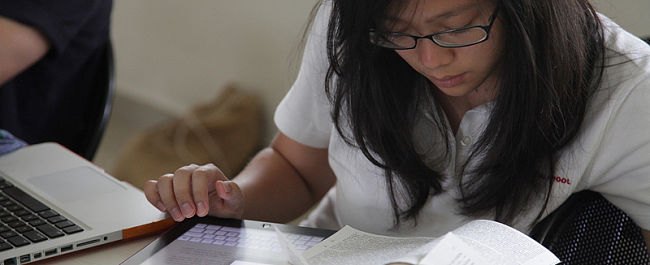Widening participation in the digital age: can online networks and technologies support underrepresented students in succeeding at university?

Online social networking practices can support the retention and success of more diverse students at university.
About the research
Participation, retention and success at university are not just about academic progress. Social engagement, a sense of belonging and particularly peer to peer relationships are also critical: from the student perspective, social and academic lives are strongly integrated.
For students from diverse and under-represented backgrounds, participation and engagement in university life are often more challenging. Digital technologies can potentially help by integrating social and academic endeavours led by the students themselves.
The ‘Digital diversity, learning and belonging’ project (DD-lab) is about Widening Participation (WP) once students have begun their university education. The study investigates how digital technologies are impacting on the ‘learning lives’ of diverse and under-represented students whilst at university.
Thirty-one undergraduate students at the University of Bristol participated in the study as co-researchers, documenting their learning experiences throughout one academic year. Co-researchers recorded informal studying practices and their use of digital technologies and online spaces, using an iPad. Under-representation was defined as first generation at university, state school attendance, black and minority ethnic, mature and local students.
Image by Lindsay Clark © THINK Global School, 2013 (CC BY-NC-ND 2.0)
Policy implications
- Policymakers and universities should put greater emphasis on the ‘participation’ dimension of the Widening Participation (WP) agenda to improve the retention and success of under-represented students.
- Widening Participation is too often seen as a set of bolt-on policies. Instead higher education institutions should work towards more inclusive teaching, learning, accommodation and facilities policies that will benefit all, without positioning WP students as ‘needy’ or disadvantaged.
- Institutional planning and WP policymakers should pay more attention to the particular needs of part-time, local, and mature students, those with disabilities, and those from diverse ethnic backgrounds and other disadvantaged groups.
- To support retention and success of under-represented groups, institutions should encourage students to develop their social and academic capacity through their own use of digital technologies and networks, beyond university provision.
- Higher education institutions should expand their understanding of independent learning and collaboration and the role these play in higher education during the digital age. Students often collaborate online over their work, sharing resources and solving problems but these practices are often hidden or under-valued.
Key findings
- Social media and digital technologies are playing an important role for diverse and under-represented students, in expanding their social encounters and informal learning activities, and in reforming their identities.
- Where, when and how students carry out their studies is changing as digital devices and online spaces ‘outside’ the university proliferate. However the academic and social potential this offers for under-represented students is not being recognized by the ‘formal ‘university.
- Students’ own use of digital technologies beyond formal classes helps to integrate social and academic work and particularly helps under-represented students to make sense of and validate their understanding.
- Online networks such as Facebook expand and maintain social networks within university and at home and create frequent opportunities for collaboration and peer support.
- Whilst these experiences are not confined to students from under-represented backgrounds, they can be more critical and empowering for those whose academic identities may be more fragile or for whom a sense of belonging is more complex.
- While these research findings apply for many students, it is important to recognize that not all students feel empowered by digital technologies and some may even feel disempowered.
Further information
Visit the project website for further information, including an overview of initial findings: http:// digitaldiversitylab.wordpress.com
Read the Co-researchers’ blogs: https://digitaldiversitylab.wordpress. com/co-researchers/
Funding
The project was funded by the University of Bristol’s Widening Participation Research Fund.
Policy Briefing 16: 2015
Widening participation in the digital age: online networks and technologies (PDF, 226kB)
Contact the researchers
Dr Sue Timmis:
Graduate School of Education,
University of Bristol
Sue.Timmis@bristol.ac.uk
Follow the project on Twitter:
@UoBris_DDlab
dd-lab@bristol.ac.uk
Authors
Dr Sue Timmis, Ms Wan Ching Yee, Dr Bernie Munoz Chereau, Graduate School of Education, University of Bristol
Related briefings
- Widening access to university: Step change needed to support talented learners from disadvantaged backgrounds
- Bursaries are an important component of widening participation in Higher Education and their funding should be maintained
- Teenage Kicks: Cultural policy and practice needs to reflect the views, lives and ideas of young people